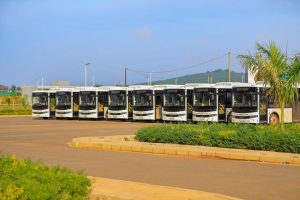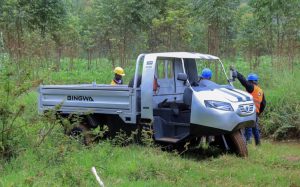
Kiira Motors unveils the 2024 8-Meter Kayoola EVS Model
6th June 2024 – Kiira Motors Corporation today delivered a batch of eight (8) 8-Meter Kayoola EVS buses produced at Luweero Industries Limited in Nakasongola to the Kiira Vehicle Plant in Jinja, bringing the total stock of Electric Buses produced in Uganda to fifteen (15). This has signalled Kiira Motors’ readiness for delivering bespoke electric mass transit solutions for the African market. The 2024 8-Meter Kayoola EVS is a fully electric city bus with a nominal range of 200 kilometres on a full charger and capacity of 56 passengers. It forms the latest offering from Kiira Motors’ rich portfolio of state-of-the-art Ugandan-made buses. The bus is built to offer the utmost comfort and convenience with features like infotainment systems, CCTV cameras, E-Ticketing & Cashless Payment Systems, Wi-Fi, inclusive design for the elderly and persons with disabilities, USB charging, ample carrying capacity, and the highest quality and safety standards. The convoy of 8 buses caused a stir as they weaved through traffic from Luwero to Kawempe, across the Northern Bypass for a brief stopover at the Kisaasi roundabout before proceeding to Bweyogerere and finally to Jinja covering a distance of 236 kilometres. Hon. Prof. Sandy Stevens Tickodri-Togboa, Kiira Motors’ Executive Chairman, said, “Uganda’s push towards becoming a net source of e-Mobility Solutions in Africa is steadily getting closer and we are proud to be contributing to this agenda. This progress has been made possible by the strategic partnership we have fostered with National Enterprise Corporation and its Luwero Industries Limited subsidiary.” He added that following World Environment Day – which is celebrated internationally on the 5th of June every year – and with the knowledge that Kampala’s air is nine times more polluted than the World Health Organisation (WHO)’s recommended limit[1] – more Ugandan public and private sector players need to embrace environmentally sustainable means of mass transit for the good of the environment with solutions that offer quality and value for money like the Kiira Motors portfolio of products. The company is also looking to mainstream the deployment and distribution of its fast-charging infrastructure to cater to its customers and other Ugandans who have embraced the electric vehicle transition. Eng. Ian John Kavuma, Kiira Motors’ Quality Inspection and Testing Manager added, “We are in the process of onboarding several partners with whom we shall work to ensure that a robust charging network is established across the country in line with the National E-Mobility Strategy for a seamless electric vehicle ownership experience.” Kiira Motors offers fast-chargers ranging between 60kW and 360kW. The 2024 Kayoola EVS comes in the following variations: 18-meter EV with capacity of 120 passengers; 12-meter EVS with capacity of 90 passengers; 10-meter EVS with capacity of 70 passengers, and 8-meter EVS with capacity of 56 passengers. ENDS For orders, go to: https://bit.ly/kmcproducts For any inquiries, send an email to: sales@kiiramotors.com | info@kiiramotors.com [1] https://globalpressjournal.com/africa/uganda/trouble-breathing-kampala-quite-likely-air/

